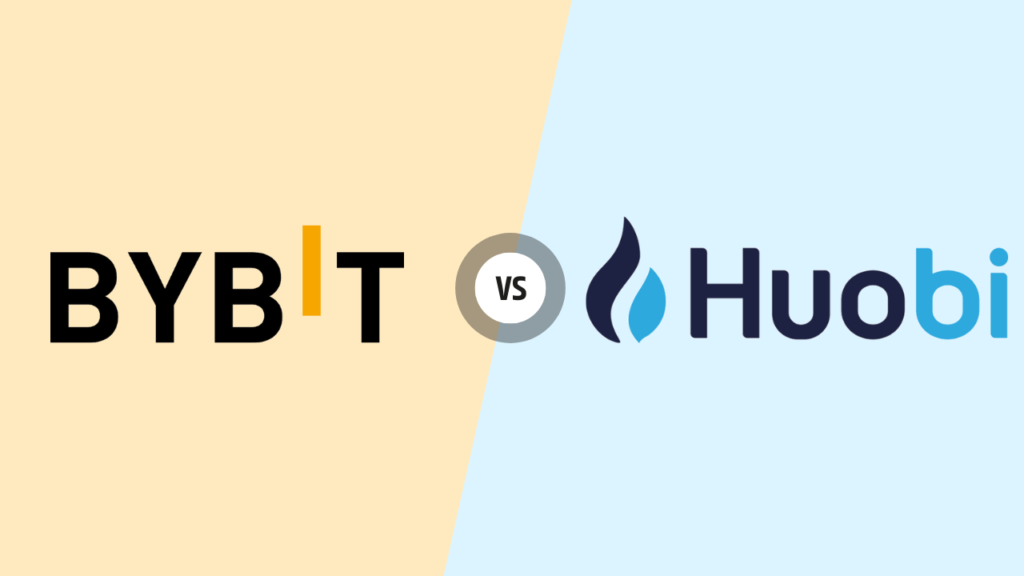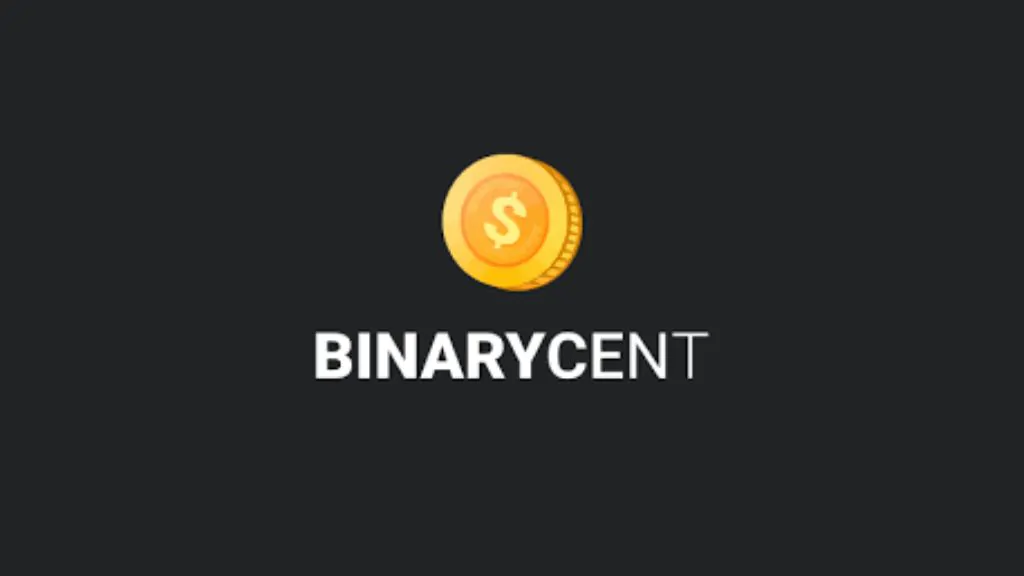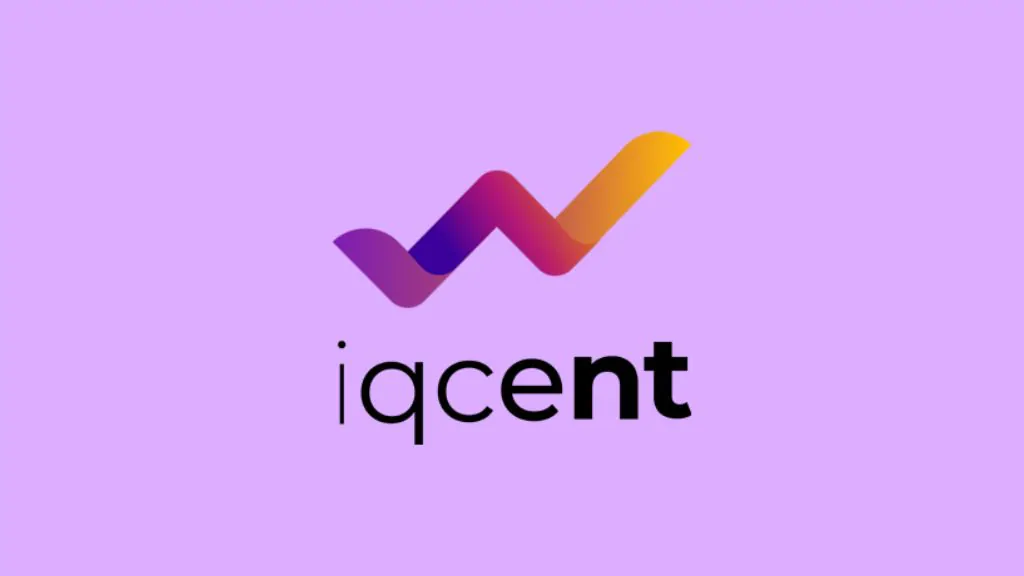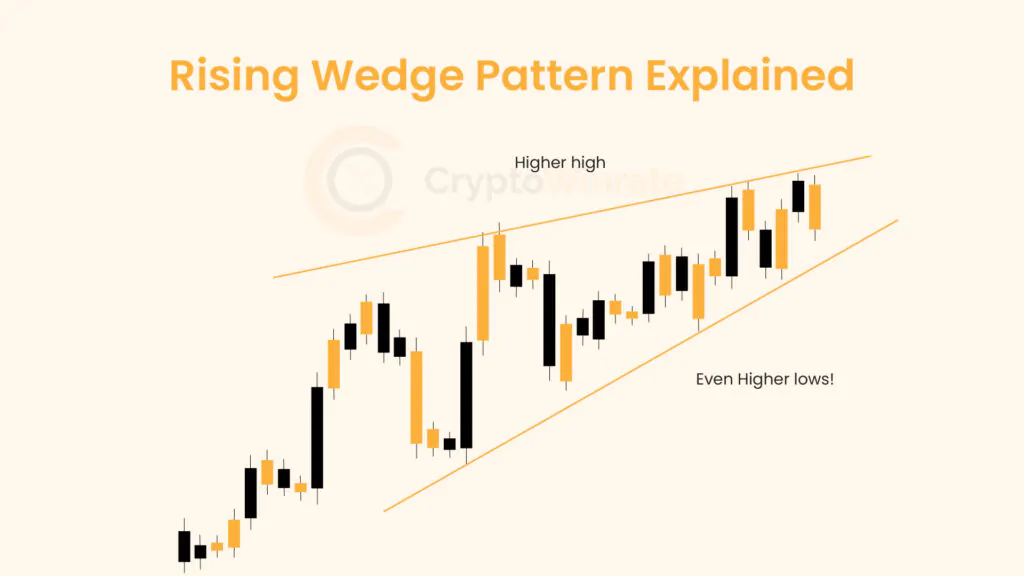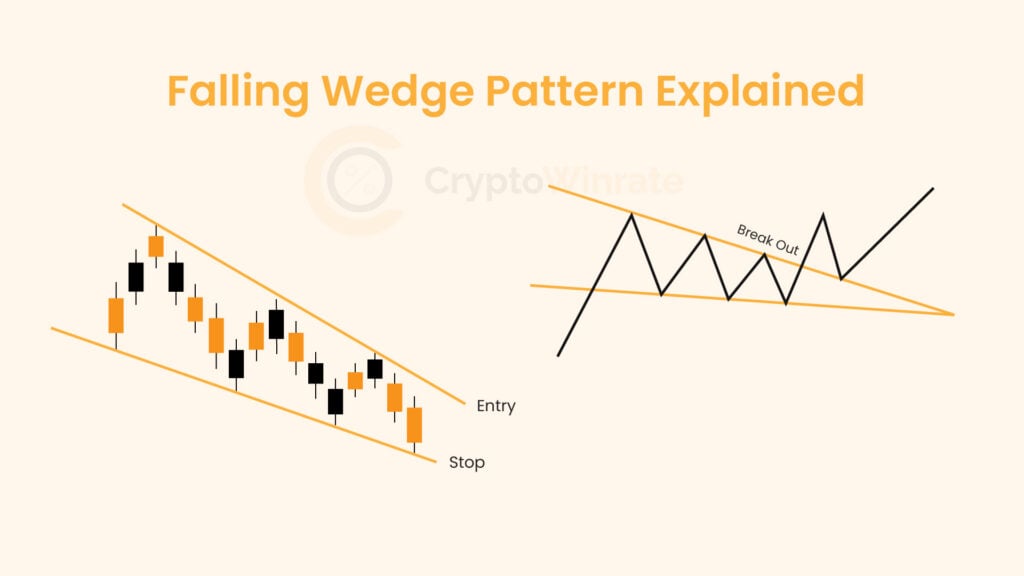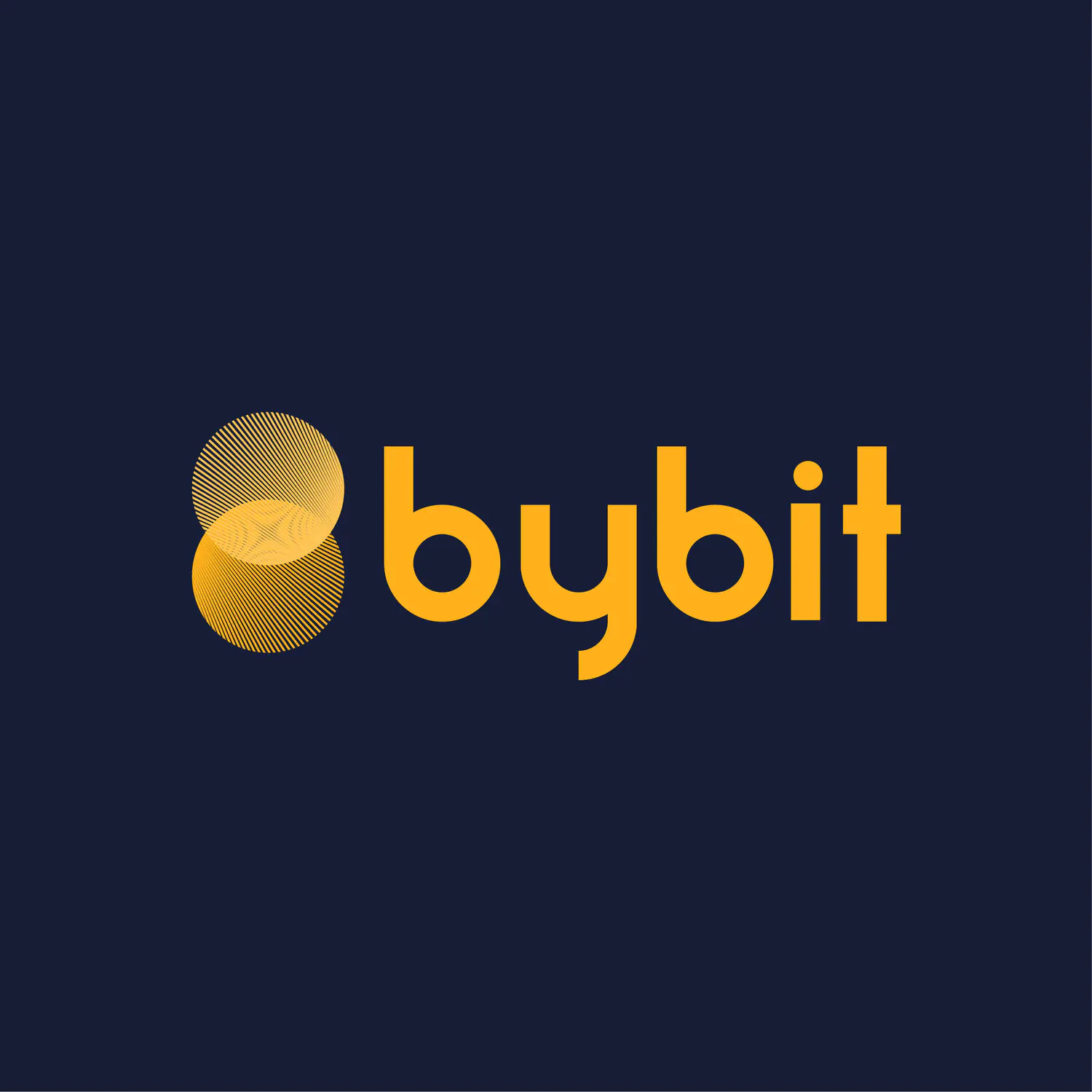If you are wondering if HTX, formerly Huobi or Bybit is the superior crypto exchange, you have come to the right place. In this in-depth analysis of Huobi and Bybit, we go over everything that you need to know. We covered everything from trading options, products, services, deposit and withdrawal methods, security, KYC requirements, and more. At the end of this side-by-side Huobi vs Bybit comparison, you will know exactly which exchange is best for you.
Huobi vs Bybit Comparison Overview
Let’s start this comparison off with a table comparing all key measures of Bybit and Huobi at a glance.
Huobi was launched in 2013, making it one of the oldest crypto exchanges. The exchange was founded by Leon Li and has its headquarters in the Seychelles. With over 20 million users and a daily trading volume of over $1.5 billion, Huobi has secured itself a spot in the top 15 crypto exchanges in terms of activities. Furthermore, Huobi supports over 600 cryptos which makes it a versatile platform.

Bybit was launched in 2018 by Ben Zhou, making it a rather new exchange. However, Bybit became the number 2 exchange globally within just a few years with over 25 million users, over $10 billion in daily trading volume, and 420 different cryptos available for trading. Currently, Bybit is located in the UAE in Dubai. One of the key reasons for Bybit’s success is its user-friendly design and its powerful derivatives trading platform with 125x leverage.

Huobi vs Bybit Signup & KYC
Both crypto exchanges offer a simple signup process that requires an email or phone number and a strong password. Within just a few seconds your Bybit or Huobi account will be created.
The next key factor that many traders care about is KYC. Some prefer crypto exchanges without KYC so they can stay anonymous. Here is where Huobi and Bybit differ.
While Huobi does not require KYC verification for trading, Bybit requires all users to verify their identity before they can use any of their services such as trading or withdrawing.
Huobi is a great non-KYC exchange, meaning you can get started right away without having to go through the KYC process. The daily withdrawal of 5 BTC is enough for most traders. However, if you want to increase your withdrawal limit, you must verify your identity on Huobi. You must submit your ID card or Passport for Level 2 KYC. For even higher withdrawal limits, you also must submit your proof of residence.
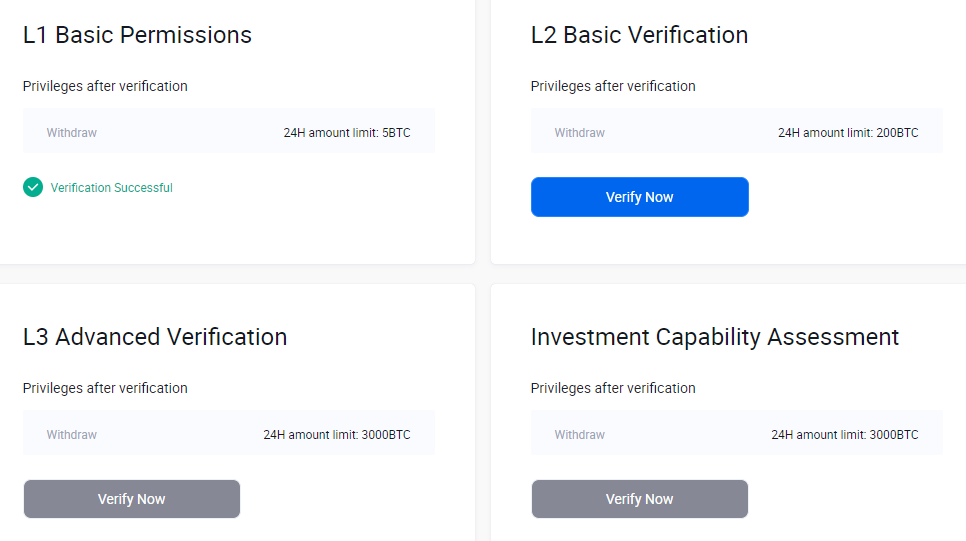
In contrast, Bybit requires KYC verification. Otherwise, you can not trade or withdraw. You might find some websites claiming that Bybit can be used without KYC, but this is wrong and their information is outdated. In order to verify your identity on Bybit, you must submit your ID or Passport and a selfie. For higher limits, you can also provide proof of address with utility bills or bank statements. As Bybit requires KYC, you can not use the platform from the USA or any other country that is on Bybits block list.
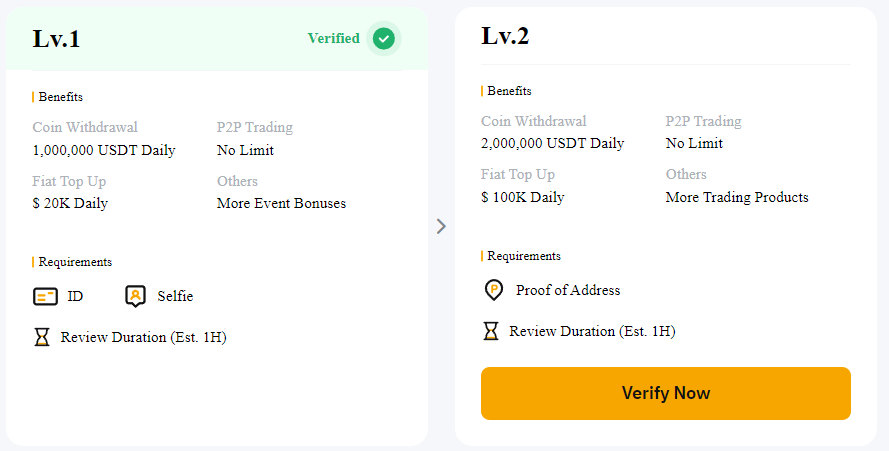
Huobi vs Bybit Features, Products & Services
As both exchanges are market leaders, Huobi and Bybit have a wide range of products and services.
Huobi offers spot and futures trading with up to 10x margin and 200x leverage respectively. For more advanced traders, Huobi even offers crypto options trading for BTC and ETH. If you want to automate trades, you can create trading bots on the Huobi spot market with just a few clicks. With an average daily trading volume of over $1.5, Huobi is in the top 15 crypto exchanges sorted by volume. The liquidity is decent but nothing special, which means the average trader won’t have any issues getting into and out of positions.
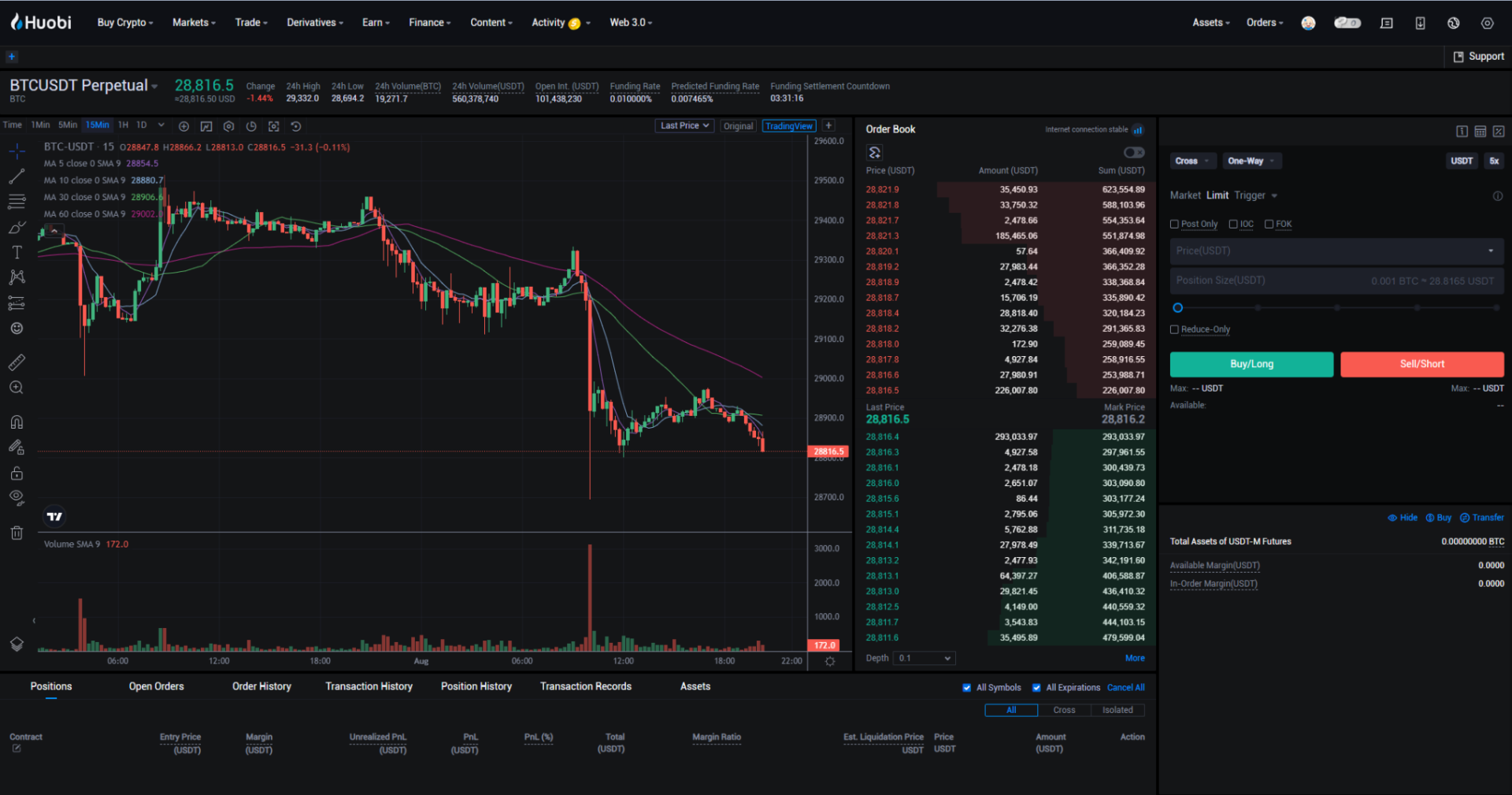
Bybit on the other hand offers spot trading with 10x margin and futures trading with 125x leverage. Similar to Huobi, Bybit has an options trading platform for BTC, ETH, and even SOL. In terms of trading bots, Bybit offers automated trading not only for the spot market but also for the futures market. Furthermore, Bybit has a “bot marketplace” where you can analyze the performance of other people’s bots and copy them if you are happy with their performance. With over $10 billion in daily trading volume, Bybit is in the top 3 exchanges. Lastly, Bybit has some of the best liquidity in the crypto space which is really important for large orders.
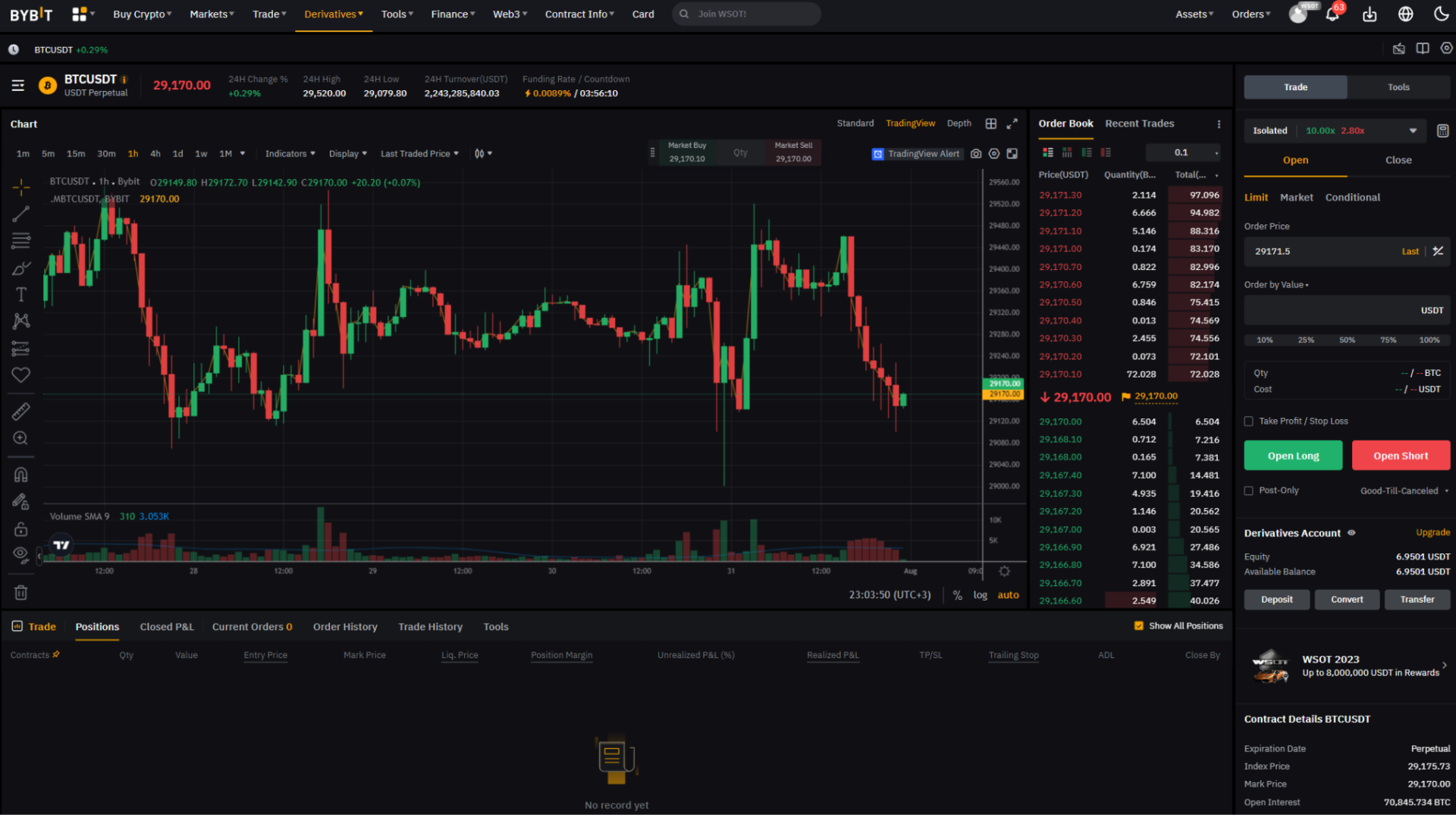
While both exchanges offer similar functions for trading, Bybit is superior to Huobi. One major critique point for Huobi is its slow and unreliable interface. Bybit on the other hand is one of the fastest and most user-friendly trading platforms which makes the trading experience significantly better compared to Huobi.
When looking at financial and passive income products, Huobi and Bybit both have a lot to offer.
Huobi offers flexible and fixed staking, ETH 2.0 staking, crypto loans, and dual investments. With APYs of up to 100% on stablecoins, Huobi offers incredibly high-yield products. Huobi dual investments can be used in the options section, where you predict futures prices of currencies and get paid for them.
Bybit offers similar earning and finance products. Aside from staking, ETH 2.0, crypto loans, dual investments, launch pool staking, and a savings account, Bybit even launched the Bybit crypto card. The Bybit card can be used for on and offline purchases, just like a normal debit card.
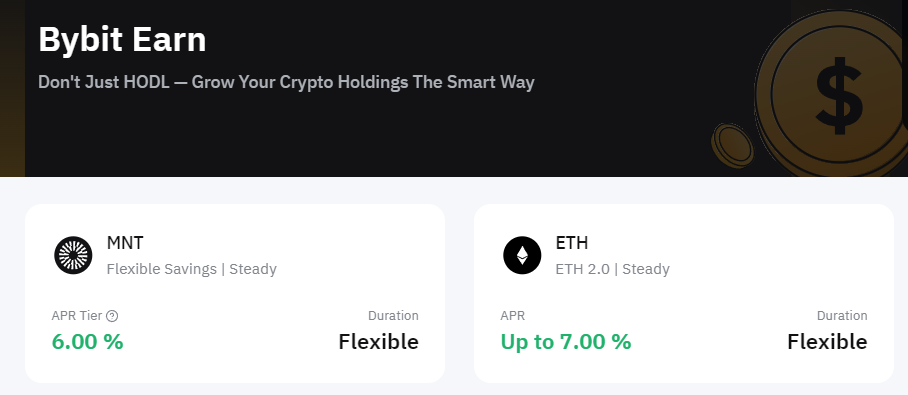
If you are interested in copy trading, both exchanges have you covered. But which exchange has better copy trading, Huobi or Bybit?
When comparing dozens of pro traders on Bybit and Huobi, we came to the conclusion that Bybit has a lot more traders on its copy training platform and therefore more advanced traders too. The copy trading setup is also easier on Bybit compared to Huobi. However, both exchanges have great traders available and you can find good traders to copy on Bybit and Huobi, but overall Bybit is superior for copy trading.
Huobi vs Bybit Trading Fees
For spot traders, Huobi charges a maker and taker fee of 0.2% which is fairly high compared to Bybit. On Bybit, spot traders are charged 0.1% for both, makers and takers. That means in terms of value for money, Bybit is the best choice as Huobi is twice as expensive. Even though Huobi offers fee discounts of 25% when holding the Huobi Token (HT), it can not compare to Bybits generous fee structure.

On the futures market, Huobi is slightly cheaper compared to Bybit. Huobi charges a maker fee of 0.02% and a taker fee of 0.05% which is a great rate. Bybit on the other change charges 0.02% for makers and 0.055% for takers. The difference is just 0.005%, though, Huobi offers better value for money on the futures market.

Based on your 30-day trading volume, Huobi, and Bybit offer fee discounts. The lowest fees on Huobi are -0.01% maker and 0.025% taker. In contrast, Bybits lowest futures fees are 0% maker and 0.025% taker. These rates are only relevant for crypto whales with over $2 billion in trading volume.
Huobi vs Bybit Deposit Methods
You can deposit over 400 cryptos on Bybit and Huobi without any fees. Deposit fees only apply for FIAT onramps.
As of 2023, Huobi supports deposits for 13 different FIAT currencies, including USD, GBP, EUR, TRY, RUB, BRL, and more. The available deposit methods are Advcash, SEPA transfers, Skrill, Bank cards, and GEO Pay wallets. Please note that not every FIAT currency supports the same payment methods. The cheapest payment method is Advcash with 0% fees, followed by SEPA and bank transfers with a fee of 1€ and 1% respectively.

Bybit on the other hand supports 15 FIAT currencies for deposits including all major currencies such as USD, EUR, GBP, TRY, RUB, BRL, etc. For most FIAT currencies, Bybit offers Advcash, ZEN, and Bank payments. The cheapest option is Advcash, just like on Huobi. The second best option is Bank Transfers with a fixed fee of 0.3€, followed by ZEN with 0.92% fees.
In terms of deposits, Bybit has the upper hand. With more FIAT currencies supported and also better payment methods, Bybit has better deposits than Huobi.
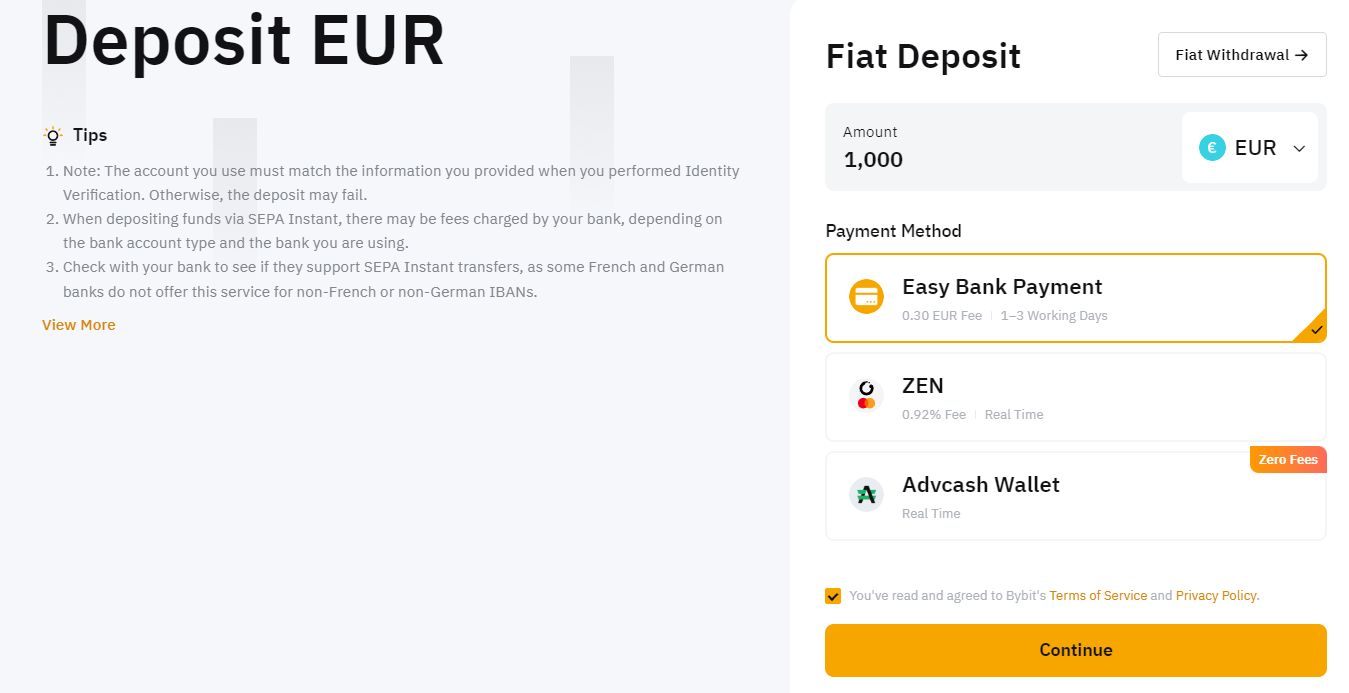
If your FIAT currency is not supported on Bybit or Huobi, you can simply purchase cryptos directly on the platform via credit card. Almost all currencies are supported here. However, note that the fees range between 2-6%, which is quite expensive.
Huobi vs Bybit Withdrawal Methods
When it comes to withdrawing cryptos, both exchanges support all major coins and chains. It is important to understand that every coin supports different networks, and every network has different fees. Furthermore, the network fees may change based on the network capacity. One of the more expensive networks are the Bitcoin and Ethereum networks with fees of $10 and higher. Some of the cheapest options are TRC20 and BEP20 which range between $0.30 and $1.
If you care about FIAT withdrawals, you will be pleased to hear that Huobi and Bybit let you cash out your profits back to your bank account. Bybit requires Level 1 verification while Huobi requires Level 4 verification for FIAT withdrawals.
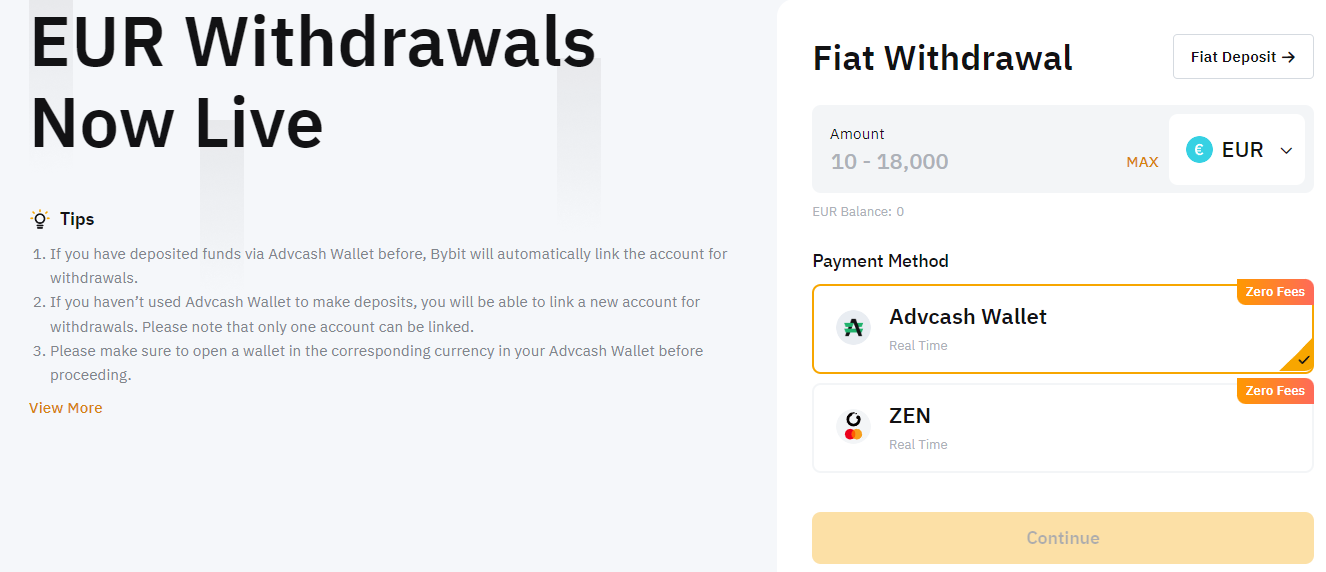
Huobi supports FIAT withdrawals for 8 currencies through SEPA, Advcash, and Bank transfers with fees ranging from 0% to 3%. Bybit on the other hand supports 13 FIAT currencies for withdrawals. The methods are Advcash, ZEN, and in some cases Bank Transfers. The fees are similar to Huobi, ranging from 0% to 3%.
As Bybit offers more FIAT currencies for withdrawals and also does not require the highest KYC level, we consider Bybit to be the winner in this section.
Huobi vs Bybit Customer Support
Bybit and Huobi offer 24/7 live chat support in the bottom right corner. When testing both support options, we realized that both exchanges have a response time of less than 2 minutes which is really quick. However, Huobi and Bybit staff differ in terms of competence.
While Bybit has the most knowledgeable and helpful staff, the Huobi support team often has a hard time comprehending our requests. The Huobi team took longer to solve our queries and sometimes even dodged questions.
Overall, the customer support on Bybit is far superior and more professional.
Huobi vs Bybit – Which Exchange Is Best?
While both exchanges are great choices, one platform made clear that it is superior.
Bybit is the overall winner of this Huobi vs Bybit comparison. While Bybit supports fewer cryptos, the trading platform is far superior compared to Huobi. With a smooth and reliable interface that is well-designed, Bybit is a top choice not only for advanced traders but also beginners. For active traders, Bybit offers one of the best platforms with the most advanced order types such as TWAP or Iceberg orders. Furthermore, Bybit has 5 times more volume compared to Huobi. Also, the liquidity on Bybit is a lot better, which is a key factor for active traders with a lot of trading volume.
Lastly, the FIAT support on Bybit is more comprehensive. With more available deposit and withdrawal methods, Bybit is the better option.
But where is Huobi better? Huobi is best for you if you want to trade cryptocurrencies while remaining anonymous. As Huobi is a non-KYC exchange, you can use the platform without having to verify your identity. Furthermore, Huobi has 600 cryptos available while Bybit only has 400. However, one of our key critique points for Huobi is the slow and clumsy interface which will give active traders a hard time.
- Active traders
- Ease of use
- Reliability and stability
- High liquidity
- Passive income products
- Copy trading
- FIAT deposits and withdrawals
Huobi is best for:
- Anonymous crypto trading
- Most trading pairs

